The Next Wave of Mobile Booking
- Published:
- October 2016
- Analyst:
- Brandie Wright

It's hard to believe that almost a decade has passed since the launch of the first iPhone, one of the most influential consumer gadgets. Smartphones have made a huge impact in consumers' lives, and nearly everyone – from toddlers to grandparents – has embraced the switch from point-and-click to touch-and-swipe.
The near ubiquity of mobile also led to enormous expectations about mobile booking in travel. However, while consumers may be quick to shop on a smartphone for everything under the sun, an overwhelming majority of sales are still made on desktop computers. Little more than a fifth of online gross bookings in the U.S. and Europe will be booked on smartphones in 2016.
Don't miss Google's vice president, travel and shopping, Oliver Heckmann, at The Phocuswright Conference (November 14-17, 2016, in Los Angeles, CA USA). During this executive interview, hear about Google's plans for some of the travel funnel's most vexing problems. Register now.
Why are so many users hesitant to complete purchases on a smartphone? What causes them to disconnect from one of the most powerful devices only to switch to another? Phocuswright conducted a study with Google in 2016 to take a look at the behavior of online travel shoppers and what triggers the mobile breaking point.
As we highlighted in the first of the study findings in
this webinar (audio recording and presentation deck available for
free download), those mobile breaking points – the key factors inhibiting mobile booking – are indeed real. But travel companies need not fret. A deeper dive into the data reveals a silver lining for the future of mobile booking. As travelers become even more comfortable with the power of mobile and younger consumers continue to age, another big wave of smartphone shopping – and booking – is yet to come.
Big Purchase, Small Screen
For most, leisure travel is a highly anticipated occasion that happens just once or twice each year. Vacations are the single largest discretionary purchase for the overwhelming majority of consumers from the U.S., France, Germany and the U.K.
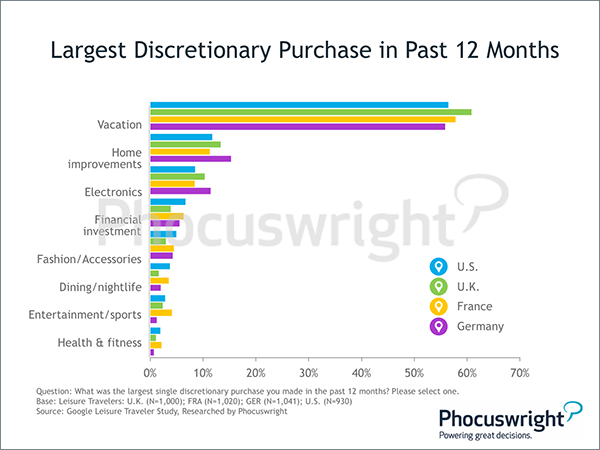
(Click the graphic to view a larger version.)
With so much discretionary income going toward a single annual event, decision anxiety can start to build. Seven in 10 travelers from the U.S. and France are concerned they will not make the best possible decision regarding vacations. German travelers, who tend to do far more travel planning, are the exception.
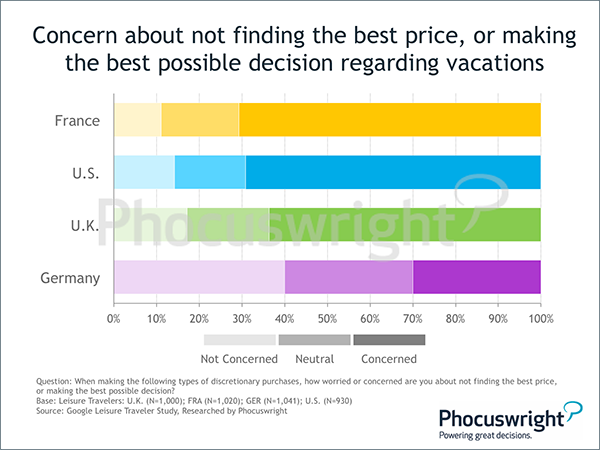
(Click the graphic to view a larger version.)
The relative importance of the purchasing decision for the typical traveler is high, and this plays a big role in shaping not just what is purchased, but how (i.e. on what device).
(Mobile) Window Shopping
Smartphones play a huge role in U.S. consumers' lives. More than one in five use their mobile to shop for everyday items. Clothing and apparel tops the search list, but flights are close behind with nearly a third browsing for airfare. Smartphone shopping is steadily rising among Europeans, though usage still trails that of U.S. consumers – especially when it comes to travel products.
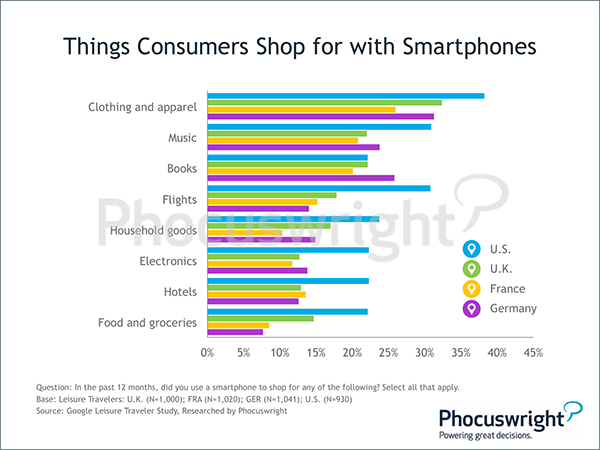
(Click the graphic to view a larger version.)
Given that 80% of all travelers own smartphones, why is the percent of travelers who use their phone to shop so low? Looking at the data by age uncovers a key trend. More than twice as many 18-44 year olds shop for clothing, flights and hotels on a smartphone than consumers 45 and up.
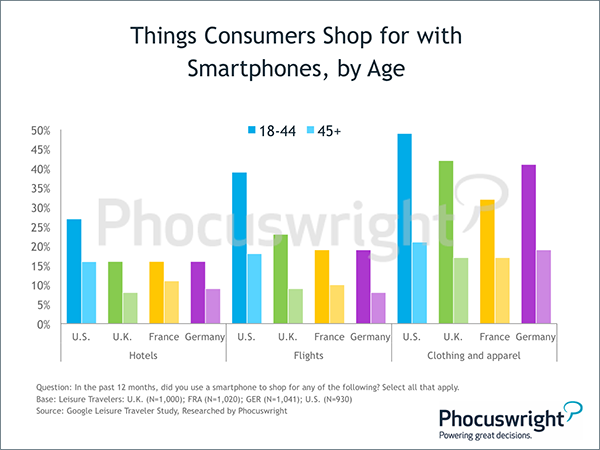
(Click the graphic to view a larger version.)
Searching for products and services is just one step in the shopping funnel; making the purchase, of course, is where the money is. However, many mobile shoppers have a hard time following through on a smartphone. Three quarters of U.S. travelers who search for flights and hotels on a smartphone ultimately purchase on a desktop/laptop.
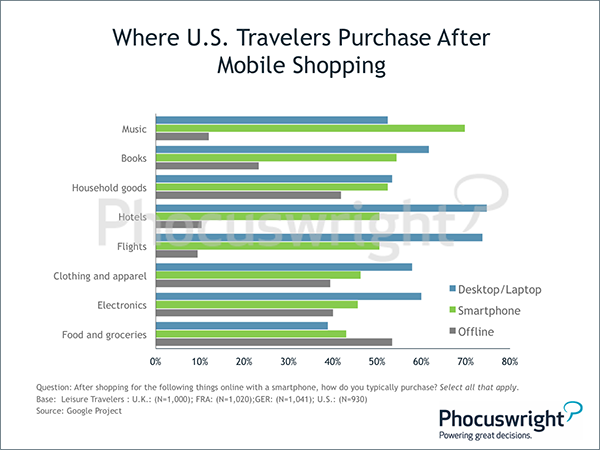
(Click the graphic to view a larger version.)
But again, age-based segmentation reveals a different story. Almost three in five travelers 18-44 purchase flights and hotels on a smartphone after shopping on the same device, which is 20 percentage points greater than those 45 and older. The same holds true for European travelers, where up to twice as many younger travelers purchase on smartphones.
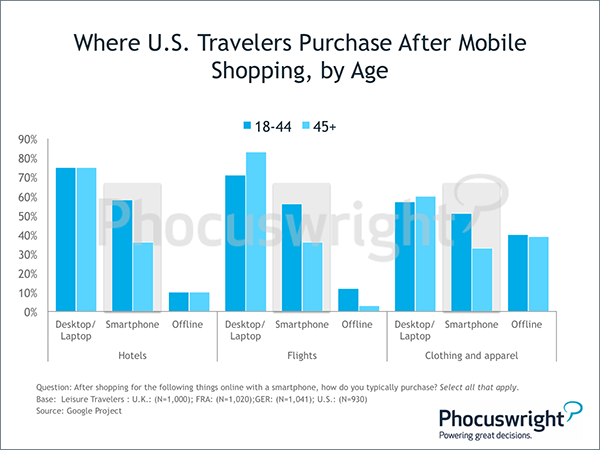
(Click the graphic to view a larger version.)
Small Screen Discomfort
Travelers are clearly more comfortable on desktops or laptops. This is especially the case with complex travel planning and purchasing. Ninety percent of U.S. travelers are comfortable with researching, planning and booking an entire trip – including hotels and flights – to a new travel destination on a desktop. On mobile, the figure falls to less than half. European travelers show even greater discomfort with mobile travel planning.
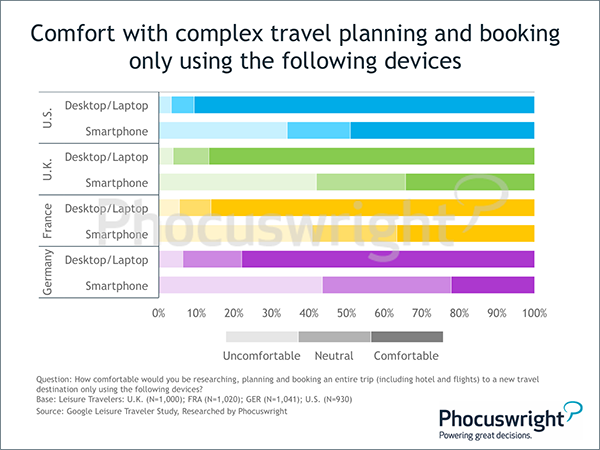
(Click the graphic to view a larger version.)
But again there are huge differences between younger and older travelers. In the U.S., nearly two thirds of younger travelers are comfortable planning new vacations on a smartphone, compared to only 26% of travelers 45 and older.
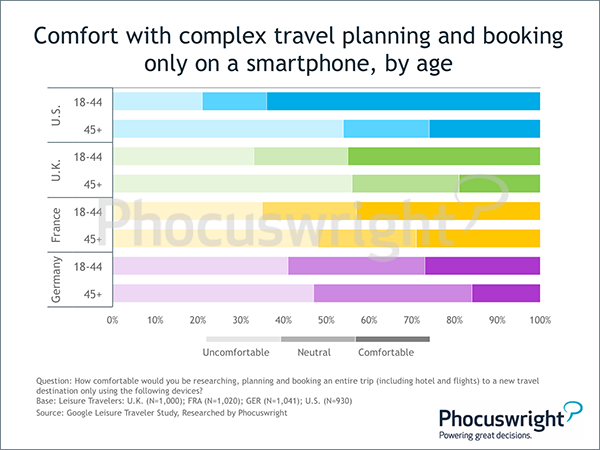
(Click the graphic to view a larger version.)
Younger travelers also show much greater confidence in their ability to find equally comprehensive flight and hotel information whether searching on a mobile device or a desktop. And more than three times as many younger travelers consider researching and booking flights on a smartphone easy.
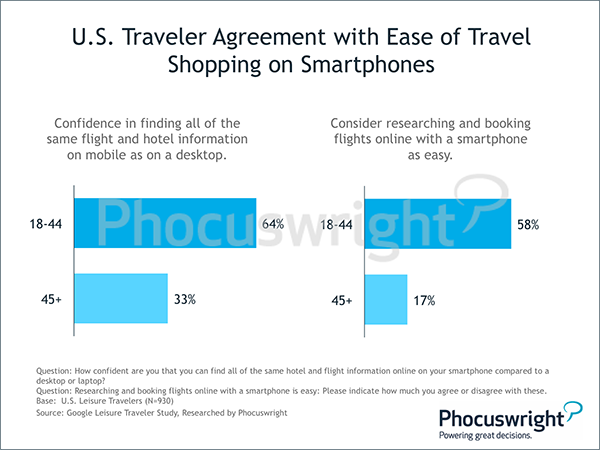
(Click the graphic to view a larger version.)
Mobile and the Next Wave
Smartphones may still account for a minority of online bookings in 2016, but the far greater comfort that younger travelers have with mobile shopping and booking means that much of the mobile revolution is yet to come. As travel brands continue to improve the mobile experiences they provide to customers, and as these younger travelers become the traveler majority, another wave of mobile and online growth lies ahead for the global travel and tourism industry.
Reserve your place today to hear Google's vice president, travel and shopping, Oliver Heckmann, at The Phocuswright Conference (November 14-17, 2016, in Los Angeles, CA USA). During this executive interview, learn about Google's plans for some of the travel funnel's most vexing problems.






.png)

.jpg)


